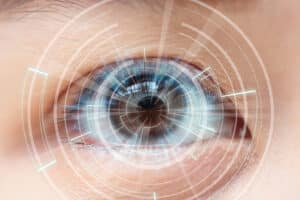
If you find that your eyes are getting red, swollen, and/or itchy—then it is highly possible that it is due to an allergy pollen, pet dander, dust, freshly cut grass, etc… In order to rid yourself of this frustration you need to figure out what is triggering your reaction and take action to stay ahead of the symptoms.
Eye allergies, or “allergic conjunctivitis” as it is known in the scientific community, is caused by a misfiring of the immune system—like any other allergic reaction. When you have an allergic reaction, your body is reacting to something that isn’t really harmful and releases histamine—a chemical that causes swelling and inflammation. With eye allergies this makes the blood vessels in your eyes swell, making them get teary, red, and itchy.
The different types of eye allergies are as follows:
- Perennial conjunctivitis: These allergies are year-round and can be triggered by dust, pet dander, and other indoor allergens.
- Seasonal allergic conjunctivitis: The most common type of eye allergy, which can be triggered by pollen from grass, weeds, and trees.
- Contact Conjunctivitis: This can be triggered by makeup, perfume, or other chemicals.
- Giant Papillary Conjunctivitis: This is a very specific allergy type that is triggered by contact lenses.
While most of the time allergic symptoms will materialize pretty quickly, it can sometimes take up to two to four days to make themselves known after exposure. Here are some allergy symptoms to keep an eye out for:
- Sensitivity to light
- Itchy eyes
- Soreness, burning, or pain
- Red irritated eyes
- Swollen eyelids
- Tearing or runny eyes
In most cases, eye allergies can be treated by over-the-counter eye drops and antihistamine pills. The best thing you can do to minimalize the effects of your allergies is to be aware of them and to take all the necessary precautions to limit exposure. If eye problems persist and over-the-counter medications aren’t providing relief, be sure to see your eye doctor for further inspection.

